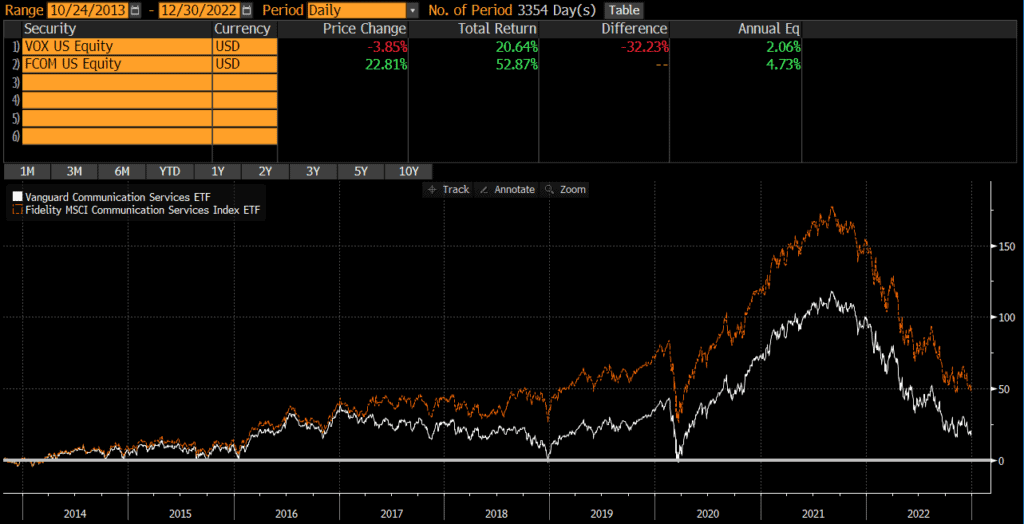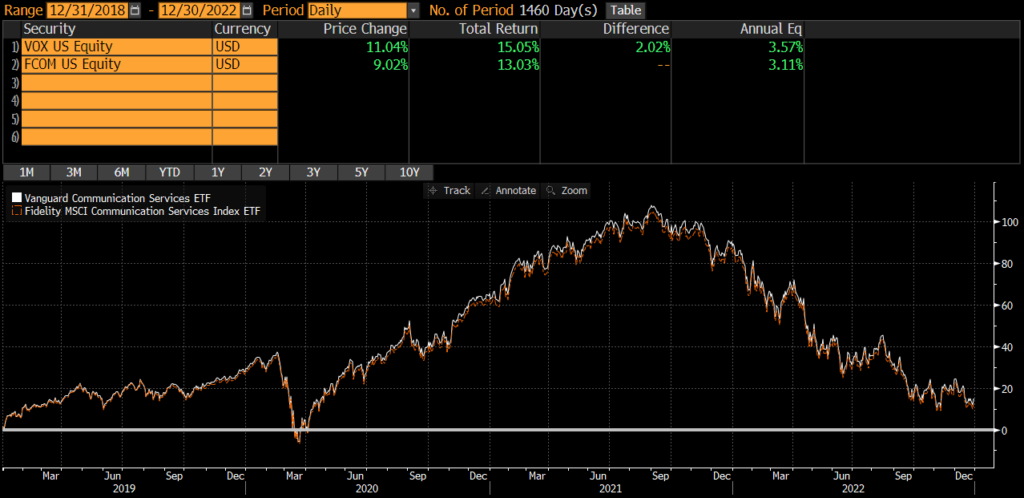The Vanguard Communication Services Index Fund ETF (VOX) and the Fidelity MSCI Communication Services Index ETF (FCOM) are two of the largest communication services sector ETFs and two of the most popular among individual investors. Many investors compare VOX vs FCOM because they are so similar. Although the funds have some major historical differences, I expect that they will be much more similar moving forward.
A quick reminder that this site does NOT provide investment recommendations. Fund comparisons (such as this one) are not conducted to identify the “best” fund (since that will vary from investor to investor based on investor-specific factors). Rather, these fund comparison posts are designed to identify and distinguish between the fund details that matter versus the ones that don’t.
The Short Answer
VOX and FCOM track the same index, although VOX follows a “full replication” strategy and FCOM uses a representative strategy which may account for performance differences. Read more about these two approaches below.
The Longer Answer
Historical Performance: VOX vs FCOM
VOX was launched back in 2004, while FCOM was launched on October 21, 2013. Since then, the two funds have performed quite differently, with an annualized difference of nearly 2.7% (and 32%+ cumulatively)!

However there is more than meets the eye here. In 2018, MSCI made some changes to their classifications which impacted the communication services indices. Vanguard and Fidelity handled these changes in slightly different ways. However, if we track the two ETFs from the beginning of 2019, we find a smaller differential, with an annualized difference of only .46%. This is still a somewhat wide difference for two funds that track the same index and may be attributable to differences in portfolio construction methodology.

Portfolio Exposures: VOX vs FCOM
Both VOX and FCOM track the same index, the MSCI US Investable Market Communication Services 25/50 Index. Consequently, the two funds have identical geographic, market-cap, and industry exposures.
A Note On Portfolio Construction
VOX implements a “full replication” strategy in which the fund holds stocks in the same proportions of the index. FCOM practices a “representative” strategy that allows holdings to deviate from the index weights a bit, but uses an algorithm to keep the risk and return relatively close to the index. This may explain the difference in performance between VOX and FCOM, but I have not researched further.
Geographic Exposure
Both VOX and FCOM hold essentially 100% stocks, so I will not dig into country exposures or market classification here. For all intents and purposes, the two funds have identical geographic exposures.
Market Cap Exposure
As mentioned above, both funds track the same index and have materially identical market cap exposures.
Sector Exposure
VOX and FCOM are communication services ETFs and so their holdings are 100% communication services stocks.
Practical Factors: VOX vs FCOM
Transaction Costs
As ETFs, both FCOM and VOX are free to trade on many platforms. Bid-ask spreads for both VOX and FCOM are extremely low and volume is sufficient to prevent most individual investors from “moving the market.” Investors looking for a mutual fund should read my post on VOX and its mutual fund share class VTCAX.
Expenses
FCOM has a lower expense ratio at .08%, compared to VOX’s .10%. Although VOX is 25% more expensive, we’re talking about 2 basis points. At these low levels of expense ratios, the difference doesn’t matter.
Tax Efficiency & Capital Gain Distributions
Neither VOX nor FCOM has ever made a capital gains distribution and I do not expect them to make any moving forward. In my opinion, these two funds are equally tax-efficient.
From a tax-loss harvesting perspective, investors may want to avoid using these two funds as substitutes for one another since they could be considered “substantially identical” (given that they track the same index and are identical in many ways).
Bottom Line: VOX vs FCOM
VOX and FCOM are identical in nearly every way, except for portfolio construction. I don’t think either fund is a bad choice, but I would personally probably go with VOX (if I had to choose, which I don’t). Investors may also want to check out my comparison of VOX vs XLC (State Street’s communication services ETF).